There is, however, a certain fundamental issue on which we continue to dither. We have yet to develop a solid national consensus that Pakistan’s future depends on strengthening the democratic process and not relying on an army-backed government of technocrats/administrators. Clearly, our politicians have miserably failed in providing good governance and the top leadership is most uninspiring, and some also carry the stigma of corruption. But it is a mistaken belief that with a military-backed government or by working outside the system, Pakistan’s problems will disappear. For this narrative to resurface frequently demonstrates that we have either very short memories or that there are powerful vested forces that are determined to sabotage democracy to advance their personal agenda. To drag the military back into politics when it is stretched to its limits in fighting and defending on several fronts, is doing no service to the nation or the armed forces. Martial law, or the facade of technocratic governments has been tried not once, not twice, but four times in the short, beleaguered history of our nation. Yet, the constant murmur of an impending ‘soft coup’ or variations of it never cease. Even as recent as last week, Jamaat-e-Islami Amir Sirajul Haq stated that the danger of martial law being imposed has been averted due to the timely intervention of well-meaning politicians.
It may be necessary to recap the dangers inherent in this choice. Seeking military or technocratic intervention by aligning some ‘self-righteous’ politicians to improve governance or eliminate corruption as a quick fix is looking at the problem superficially. Experience the world over has demonstrated that corruption reduces as democratic institutions get strengthened and increases manifold when dictators or the military is in power, even if temporarily it creates an aura of discipline and change. We have classic examples of this — the Suharto regime of Indonesia, Hosni Mubarak of Egypt, Fernando Marcos of the Philippines. There is another fallacious belief that military regimes have outperformed their democratic counterparts. Ayub Khan, Yahya Khan, Ziaul Haq and Pervez Musharraf eras are compared with those of Benazir Bhutto and Nawaz Sharif out of context. The short duration of the civilian set-ups and the limitations imposed on political leaders is not taken into consideration. Also, it is not factored that after prolonged military rule, civilian institutions get further emaciated. Moreover, our military rulers harvested massive economic and military benefits by aligning with the US during the Cold and hot wars. They were able to acquire legitimacy through these alliances. But the dark side of it is that these alliances led to the growth of militant forces that have turned inwards. Whatever the temporary gains, they were quickly wiped off with dire consequences for the economy. The flow of military hardware and lavish economic assistance gave a false sense of comfort to Ayub and he launched a clandestine operation in Kashmir resulting in the 1965 war that destroyed the economy. The heart-rending separation of the erstwhile East Pakistan occurred due to serious policy failings of two military dictators, Ayub and Yahya, in complicity with Zulfikar Ali Bhutto. Similarly, Zia’s policy of supporting the Afghan jihad has been an unmitigated disaster and destroyed not only our economy, but has seriously impacted the security and social fabric of our society. Musharraf’s venture into Kargil, the mishandling of the unrest in Balochistan, the delayed and ill-planned operation against militants in Lal Masjid and the mistreatment of Chief Justice Iftihkar Chaudry triggered a nationwide civil disobedience movement. This recall is necessary to remind ourselves that the country’s salvation does not lie in handing over the reins to a technocratic government that has come into power on the back of the establishment or by undermining a legitimate government.
Strong institutions, with a robust system of accountability, are the best weapons to minimise corruption, fight militancy, improve governance and pursue policies that are people-sensitive. Effort has to be made at improving institutional mechanisms for strengthening civilian control over military matters. For this, it is important that the civilian leadership understands issues related to the military and not follows the current path of least resistance by continuing to outsource major areas of foreign, defence and security policies to the military.
Weak state institutions need strong and far-sighted leadership, both in the government and in the opposition. Imran Khan is critical of the prime minister and the federal government and his criticisms are valid. However, whether the PTI has enough to show in Khyber-Pakhtunkhwa in terms of performance can be debated. We need leaders who are result-oriented and are dedicated towards strengthening institutions so that people develop confidence in democracy. Then only will rumours of the system derailing will fade away.
Published in The Express Tribune, October 15th, 2014.
Like Opinion & Editorial on Facebook, follow @ETOpEd on Twitter to receive all updates on all our daily pieces.
COMMENTS (46)
Comments are moderated and generally will be posted if they are on-topic and not abusive.
For more information, please see our Comments FAQ

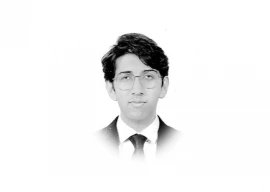

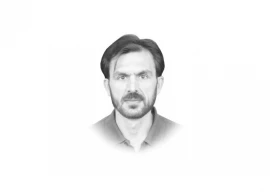


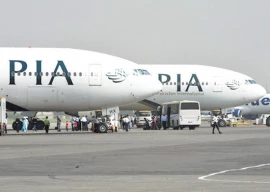
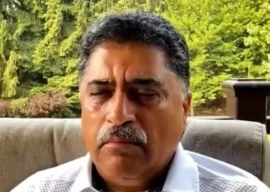


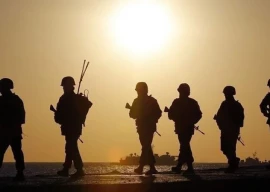


Dear All,
To argue for or against " democracy in Pakistan ", though debatable, it all boils down to one thing that we are missing in all comments. All those countries being compared, especially CHINA, it is education....period. In CHINA, the people are not bothered whether they are living in a democratic system or not, as long as they are contented with what they have for themselves & their family, peace, employment, which again bowls down to no law & order problem, no shortage of electricity & plenty of employment, & education...all the ingredient that a country economic based country need as a policy to pursue. If CHINA had pursued " security policy " as USA, they would had to put all their FOCUS in spending all their resources in security like USA. CHINA was an isolation till the 70s, but kept pursuing economic policies for the welfare of their people, while we kept up the boogey of Kashmir & FOCUSED our resources on the eastern front. It is history that we in general invited " martial law & dictators " to save us from the civilian govt as it did not deliver as expected...is this not true ? Corruption is every where, in every country in one way or another, but, while we gobble 90%, others gobble 10 %...
@John Turney: As I said Germany is no longer under occupation but an equal member of NATO! The four power agreement has ended after German unification. The following text highlights the Four POwer Agreement on Berlin
Vertragsabschluss 1971
Vertragspartner US, Great Britain, France, USSR (four victorious powers of World War II)
Ziel The Agreement sets the status of Berlin as a ?Four Power City?. The USSR obligates itself to facilitate and not to hinder communications between the Federal Republic of Germany and West Berlin. Improvement in communications between West and East Berlin is agreed upon.
Vertragsgegenstand The Agreement sets the status of Berlin as a ?Four Power City?. The USSR obligates itself to facilitate and not to hinder communications between the Federal Republic of Germany and West Berlin. Improvement in communications between West and East Berlin is agreed upon.
Bedeutung The Agreement is invalidated by the reunification of the two German states in 1990.
The good thing is that there was no Treaty of Versailles at the end of WW2 but a marshal plan to rebuild Germany, said recently the current President of the European parliament. Have a nice day sir.
Rex Minor
@Aussie: "How can this “democracy”, now given multiple opportunities, lead to our national salvation ?"
We are so convinced that if the ritual of using the ballot box every four years becomes compulsory in the country, all will be find and dandy. Democracy is not that. Replacing one group of crooks with another one every four years, will not improve the lot of the disenfranchised.The unwashed will remain unwashed. The 20 car motorcade will not disappear.
Unless we come up with a mechanism where the ruling elite is replaced by folk that are honestly answerable to the electorate itself. All the smoke and mirror shows in the parliament and the sickening rituals of panel discussions on the TV will go on for another 100 years, without making a dent.
Schooling has to become more common which does not mean that the voter has to be a degree holder. Tribal, ethnic, sectarian, parochial affinities have to replaced by human values of justice and equality. This can be achieved by getting rid of elite institutions instead we should begin by introducing democracy to the masses at very grass roots level.
@Rex Minor: You make various valid points, However the following countries are living under American occupation! Germany is subject to the four power agreement until 2099 backed into this corner with several hundred American nuclear weapons with many thousands of foreign troops on their soil and cannot expand their military in proportion to their population All legislation has to pass the four power smell test if you get my meaning! Japan South Korea are similarly occupied with similar agreements however these are entirely US validated! As for democracy The US is a republic and has only a loose association to the democratic process Yes they vote on electronic machines that are entirely arbitrary when it comes to the count! Then representatives are sent to an electoral collage mandated to vote the way of rigged computer tally, however they can vote their own opinion and select the guy or gal they like. Democratic it is not!
@Rex Minor: Dear Rex, You wrote a good reply as usual, but in regard to Germany not being an occupied country, we will have to agree to disagree. I could give details if you wish?
@Sexton Blake: Sorry Sir, but I had no intention to suggest any qualification of the democratic order in various countries. I prefer the German system since it affects me and I guess that the Americans would prefer theirs as they are not a homogenious people but made up from the immigrant communities. Chinese civilisation have lived through various phases including when it was occupied. They have not yet confirmed their preference yet but communism lives no longer. Pakistan in my sincere opinion is still struggling with the colonial structures and are finding it difficult to evolve into a genuine union of Nations since it has several Nations with distinct language and culture and like switzerland require perhaps a federal system each region fully independent of the police or military proxy of the central Government. Reforms are definitely needed. Incidently, Germany is a country of law and respects to the letter its contractual agreements but it is definitely not occupied by any foreign element.
Rex Minor
Dear Rex, I usually agree with what you say, but you really got it wrong this time. I think you are suggesting that the US voting system is one to be admired, and if this is so I have to disagree with you. I would suggest that the American system leaves much to be desired. In regard to the German and Iraqi voting systems who do you think put them in place, and of course they are still occupied countries?
@Feroz:
And, to top it all Sir, the Supreme Court does not know the meaning of the words Sadiq and Ameen. It has tied, and failed to find the definition of both the words even in the Constitution!
@ishrat salim: The Chinese do not practice democracy which the Americans do, nor do the Germans follow the American system of amendments. Democracy does not simply mean the Government of the majority, it means the inclusiveness and representation of all people, neither the Iraqi Government nor the current Governance in Pakistan is compatible with democracy.
Rex Minor
@ishrat salim: South Korea and Pakistan share similar history. Both were created through partition form imperial colonies (Pakistan from a British and S. Korea from Japanese). Both went to war in their early days, remained under military dictatorships till the 80's. However S.Korea showed progress after establishing democracy in the late 80's. That is when we started hearing of Samsung, Daewoo, LG etc. The difference is that while democracy became strong in South Korea after during the 90s, we saw covert and overt military interventions. Calling Singapore a dictatorship is debatable but it certainly was not a military rule. Examples of military rule could be Burma, Sudan, Nigeria of Britain under general Cromwell.
Fathering an illegitimate child outside of marriage, is unlikely to pass the Sadiq and Ameen test, I am sure. We can therefore rest assured that no one will get disqualified because of this clause, it will be used only when puppet tries to chart an independent course.
A very sane voice and honest analysis. I hope Pakistanis ponder these wise words of the author. Unless and until Pakistanis are bold enough to look at themselves in the mirror and admit the wrong priorities and values of the past six decades and the mistakes, Pakistan will further continue to regress towards 7th century.
I do not understand why ET has had so many good articles lately and why so many of the missives have been excellent. Why I am even agreeing with wonderer (just joking-you make some good points). However, the topic is really about democracy or the lack of it or whether an alternative would be better for Pakistan. I think the current system with all its faults is the best one for Pakistan. In spite of all its faults I just cannot see any self respecting Pakistani.accepting an alternative government such as the semi-dictatorship of Singapore or China. Some people can accept strict discipline and others cannot. Pakistani's belong to the latter group. I have not made any serious comparison between Pakistan corruption and Western corruption, but would suggest that Pakistan is still at the starting gate. Western corruption is not even covert. It is right out in the open if anybody wishes to look. Basically, the problem with democracy is that the people make their wishes known to the politicians who just scrape in and then the politicians ignore them until the next election. The politicians know that whether they make it into government or not they will continue to receive their pay cheques. However, it is fairly evident from the missives received by ET that the Pakistani people are letting the Government know that they are not happy, and that can only be a good thing. If one looks at the current upsets in the Western world it becomes evident that Pakistan problems are not isolated incidents.
@ishrat salim: @Ahsan Abdullah:
May I enter the argument with a bit of my humble input Sirs?
China has a system all of its own. It is neither communism nor democracy, but a highbred combining the strengths of both. But it is not easy to administer; you need a Government like China’s to do so, along with as draconian a judicial system as China’s. The system evolved out of a long struggle for independence. It is also not likely to last for too long according to many experts. It is becoming evident looking at the present upheaval in Hong Kong. China is also infamous for Tiananmen Square protests of 1989, and the ensuing massacre. There is no country in the whole world looking up to China as a role model despite its impressive economic advance. Human Rights and justice are becoming more and more important by the day in the civilised world.
As for Pakistan it must evolve its own democratic system. Copying any one, even India’s, is not going to work. Remember, we did not struggle like India for independence; we had one man getting us all we wanted. Then we begged and borrowed to buy weapons needed to grab Kashmir. We have lacked in leaders with vision and wisdom, and have depended on falsehood and keeping the masses ignorant and brainwashed. We have yet to find a national identity we are jointly comfortable with. We have learnt nothing from our history. (It hurts to say this, but can we overlook facts?)
Consider this old bit of wisdom. A country gets only as good a Government as it deserves, and a Government gets only as good an Army as it deserves. Accordingly, we will get what we deserve and only what we deserve. Let us deserve what we desire.
@Ishrat Salim. Each time a dictator usurped power he stayed on for an average of 10 years while average life of a democratic govt was probably 3 years. Did Mush need 25 years to implement his development plan , if there was one? Inspite of being in power for 9 years he could not take a single major decision except to join the west in Afgan war. A case in point is how Kalabagh dam was basically shelved in his time. You praise China but Russia also has developed tremendously. If their development was due to autocratic rule then Most Arab rulers remained in power for decades but their people suffered. On average you will find countries with democracy progressing while dictatorships not delivering almost anywhere. Even Africa started developing after its dictators went away and democracy ushered in. Finally, each time a dictator took over in Pakistan western money poured in which is partially the reason for a false appearance of economic growth in those periods. .
@Ahsan Abdullah: Thnx, however, you have missed CHINA again...but having said that...S Korea was itself under a dictator for more than a decade, so was Singapore too. So, why not let a technocrat govt comprised of national govt do the cleansing. Are you not aware the type of people we have from top to bottom ? Do you think, people can wait for loot & plunder to continue till next election till all resources in our country go dry & we should be advised for the govt to continue till their term end...what kind of logic is this ? go & give this advise to the poor people in the street....have some pity for the poor, please ?
@ishrat salim: It is actually about the system. Whatever the system is, communism, democracy (presidential, parliamentary etc), you let it work and it delivers, if it is based on justice and fair play. Our democracy has been stabbed so many times by martial laws that it has been unable to deliver. Let it function and it will, just like South Korea, Australia, Singapore etc.
No one has answered my question yet on " CHINA without democracy, how have they become a world power & even today when there is call for " democracy " every where, CHINESE leaders give a damn.....
@Dr. Abid Shah Mashwani: Would you care to research on and enlighten us on: 1. What was the external debt before General Iskandar Mirza took over and after 1971 when democracy returned 2. What was the external debt before Bhutto and when he was toppled by Ziaul in 1977. 3. What was the external debt before Mush took over in 1999 and the figure when he was ousted in 2008. 4. How much Aid these generals received to serve foreign governments. 5. Also if you can give source from where you extract these figures. It would certainly help the readership.
Mr. Masood, you have narrated your arguments very nicely, especially your reference to other democracies and dictators regime make your point compelling. However, selective references could make your case bias. For instance, I will use two sets of data, one from world bank on economics, and second from US government to prove from CORRUPT democracies anything will be better for a nation and country.
Yes, democracy is good if it is honest and serve people - especially if electoral process is fair and free, since people could punish corrupt regime, esle they could take turn despite the fact people may hate them in Sindh and Punjab. And to control the system such democratic regimes evolve around families. In USA, yes government is democratic but all key (Finance, Education, Energy, Defence, Commerce) cabinet members are career technocrates of high academic standings such as Ph.D., graduates of Harvard, Standford, London Sch of Eco. etc. Look at the list of cabinet members of Bush senior, jr, Clinton and Obama. While in corrupt democracies, Kh Asif, Raja Pervez will Energy ministers, Mr. Tappi, Pervez Rasheed etc will be high profile ministers.
Now let's look at economic numbers comparison between dictators era and democratic era in Pakistan (data from world bank database):
Measure Ayub ZAB Zia BB/NS Musharaf PPP/PMLNGDP growth, avg 4.5 0.6 3.4 1.3 2.8 1.4 External Debts, US $ million 8.9 275.1 1176.4 1441.4 1533.6 3801.4 Inflation 3.1 13.9 7.4 10.3 9.6 12.9
Based on these figures, Pakistan GDP growth was about 1.1% during democratic corrupt govt and 3.6% in dictators rule. Similarly, Pakistan external debt disproportionately increased during democratic regimes. These are only external and we all knew domestic debts increased even more as they rit off loans. Also look at inflation, on average around 12% in democracy and under 7% in dictatorship.
Yes true democracy is better than anything but from corrupt democracy ANYTHING is better.
@Aussie: You must do some research before slandering Mr Jinnah. It was not Mr Jinnah who started corruption or backed feudal culture. He in fact attempted to eliminate that. He would deride those giving him protocol and preferential treatment and that is exactly why he was eliminated by vested interests. How else can you explain the ambulance of your head of state breaking down and no alternate transport being made available to shift him to the hospital? the vested interests manifested themselves as Generals Mirza, Ayub, Ziaul and Mush. Mirza bred political manipulation, mismanagement and corruption and Ayub furthered these and went on to rig the 1964 elections to install himself as lota-in-chief. Ayub had actually lost the elections to Ms Fatima Jinnah. He and his successors Ziaul and Mush bolstered feudalism by bestowing generals with prime agricultural land and loads of plots, creating a feudal lord out of every retiring general. The real culprits are these corrupt generals, not politicians and democracy unbridled by the military and bureaucracy is the only solution, not quacks like IK and Tahirul Qadri.
Very few knows Singapore is a role model country in religious pluralism
Now in Asia Pacific there is one country and it is a role model country and maintained religious pluralism, Singapore was led by Prime Minister Lee Kuan Yew with an iron hand, this is how Singapore maintain its pluralism. Many countries in order to achieve economic progress becomes rich, but very very very few of them achieves religious pluralism and economic progress like Singapore.
Singapore current level of harmony is not of natural state, they have seen bloodshed and violence on their roads. How do create harmony
1) Singapore believes that the most practical approach in building a harmonious multi-racial and multi-religious society is integrating all races within a national framework. Each community, be it by race, religion or language, can be thought of as a circle and the area where the circles overlap one another is where all Singaporeans, whatever their race, religion or language, work and play together.
2) Meritocracy (jobs opportunities based on merit, talent not caste or referrals) ensures that Singaporeans from all communities can progress and be rewarded according to individual merit, and no one is discriminated against or disadvantaged on the basis of race, language or religion.
3) Secularism refers to the approach of separating Government policy decisions from racial or religious priorities, within the context of a secular state. The Government does not regulate religious activities, but works with religious organisations to deliver programmes that benefit society in general. For example, the Government partners the welfare arms of religious organizations in providing family and social services. Similarly, the cloak of religion like are not permitted to enter politics or Government.
4) In Singapore, there are constitutional and legal provisions to protect the rights of minorities. Key institutions / legislative measures include the Presidential Council for Minority Rights (PCMR) which scrutinizes every piece of legislation passed by the Parliament to ensure that minority rights are not infringed. The Maintenance of Religious Harmony Act (MRHA) was introduced to give the Government powers to issue restraining orders and to take stern measures against individuals who stir up hatred between our ethnic and religious communities.
5) The electoral system ensures minority representation in Parliament so that political parties to practise multi-racial politics rather than to take political advantage based on race or religion.
6) The Tripartite Alliance for Fair Employment Practices which has introduced a set of guidelines to ensure that employers hire on merit - regardless of age, race, gender, religion, family status or disability.
7) A top-down approach of promoting racial and religious harmony must be complemented by working in partnership with the different communities towards commons goals and benefits. It is therefore crucial to provide platforms and opportunities for different community groups to interact and work with each other; so as to widen the common space, build relationships, mutual trust and understanding among each other.
8) At the national level, the Community Engagement Programme (CEP) is an initiative introduced for community, ethnic, business, religious and grassroots leaders to network and build understanding across groups. This network is replicated at the grassroots level, with similar networks known as the Inter-Racial and Religious Confidence Circles (IRCCs) established in every constituency. This creates a multiplier effect in promoting dialogue at the people-to-people level. Today, 89% of all religious organisations in Singapore are part of these networks, which have proven crucial not only in building bridges, but also in mediating occasional unhappiness over differences in religious practices among groups.
9) The counselling program RRG a volunteer network of local religious scholars and teachers acting in their individual capacities to provide religious counselling for detained members of the Jemaah Islamiyah (JI) to wean them away from radical ideology
Lee Kuan Yew passed one anti corruption bill and put all 23 corrupt ministers in Parliament in jail and finished corruption in a year. Lee Kuan had to lock up communist, language chauvinist and religous extremist in jail without trial since Singapore had strong communist movement who wanted a communist Singapore. He did judicial and social reforms where he passed strict laws, so that companies who invest will feel safe about investment with property rights and legal process and they don't have to bribe anyone to get the paperwork done and eliminate graft and red tapism. Singapore today has 7000 MNC companies, 26,000 international companies and 1 lakh SME for their 5.5 million population and it is gateway to Asia pacific.
How did Singapore bring so much investment. Lee Kuan Yew made English as first language at workplace and school, educate their workforce, invite best talent and induce meritocracy and multicultural Lee realized what are other countries weaknesses can be our strength like in APAC region, India has red tapism, corruption, long paper work,and complicated beaurocracy. China has language problem, Japanese follow different work culture, Korea and Taiwan are different and ANZ is more like EU. Singapore invited best talent and integrated all culture in workplace but meritocracy as system . In real fake multicultural democracies like Canada, UK invite people from world but expect them to behave like them. So with help of all culture, Singapore become center of APAC and gateway and head office of almost all MNC companies in Asia Pacific where it communicates to China in its language and mannerism, deals with India and other key region because it had those people in workforce.
Lee Kuan Yew managed news media very well. He said one value that does not fit Singapore is media acting as fourth estate. The American concept of marketplace of ideas instead of producing harmonious enlightenment has led to violence and bloodshed means media in Pakistan and India is often called the fourth branch of government (or "fourth estate"). That's because it monitors the political process in order to ensure that political players don't abuse the democratic process. Paid media by politicians, actors, businessmen cannot be the voice of nation, certain debate on TV on sensitive topic can lead to division, hatred and fear. It is more dangerous when it is not monitored for content and media wind created for example recently in India was Modi wave created by media by taking millions of money. Average person do not have logics to evaluate pros and cons of it, and wherever the wind blows, people go with the wave, then you are not a leader.
If only the Pakistani army/ ISI had more personnel like the General, Pakistan would have been able to make progress.
A well thought out analysis and prescription. It is heartening to read the General admitting to the follies of the army's misadventure that had serious setbacks to the economy, despite army apologists claiming economic growth under military rule.
@Sexton Blake Masses are always manipulated regardless of the system. North Korea and USA are at the most divergent end of autocracy and democracy and in both cases the masses are manipulated in different ways. Grassroots democracy with transparent methods is the less bad choice.
This was an interesting article and most of the contributions were excellent. Obviously democracy is the way to go, but it certainly has a lot of problems. Democratic systems have a great deal of corruption, but politician and their supporters are very slick at hiding it. One or two Western, so called, democratic countries are great examples of corruption and other problems. Additionally, if one looks carefully at how people are selected for senior positions in government, commerce, military, and how contracts are awarded, you will generally find that people from certain families or backgrounds are invariably selected. Also the media is invariably controlled by a few, and although they do not tell lies the truth is presented the way the few want it to be. I am afraid the broad mass of people are manipulated if not exploited in democratic systems everywhere.
@ishrat salim:
You are welcome.
I agree with your line of thought. In my opinion, for whatever it is worth, we are not democratic by temperament. We have not seen democracy even at any time of our history from seventh century onwards. And we also did not get a chance to see it develop in our land. In India it developed steadily. Indians have gradually become democratic by temperament.
We will at some point of time become democratic, but it will be a kind of democracy that suits us. No one will ever be able to thrust his version down our throats.
@Wonderer Outside solutions have neither worked in the past nor will they work in future. We have had many technocrat governments before and it has not worked. Let those who consider themselves to be good and are inside the parliament try and fix the bad eggs that are sitting there.
@wonderer:
Thank you...I was trying to justify " techno govt " as an interim set up before we can really bring in " democracy " & reforms needed for the overall welfare of the people in general as per constitution.
@ishrat salim:
I couldn't agree with you more. But Sir,
Do we have a Lee Kuan Yew among us? I'm not sure.
Do we have the kind of Generals BD has? I have my doubts.
China learnt their lessons the hard way. We had just one man getting us all we wanted. Besides we needed US weapons to snatch Kashmir even before we leant how to stand on our feet. China was still fighting a war of liberation at that time.
BOLD and gentle writeup.
You Sir, a through gentleman.
History has 2 classic examples :
1) Singapore : was part of Malaysia till 1959 as a federating unit, till it got separated as an independent country on 09 Aug 1965. Mr Lee Kuan Yew was its 1st President & remained at the helm for 2 decades. He ruled the country with a team of technocrats for 2 decades until election was done & " democratic system of governance " was introduced.
Hence, we should take some cue from this great country, which was undisputedly under civilian dictatorship for all practical reasons for 2 decades, in order to put the country on the path of progress, which the Singaporeans today are benefitting from the labor, hard work & honesty, vision & policy of the govt of Mr Lee Kuan Yew. Today , where are they & where are we ?
2) Bangladesh : Bangladesh was in similar turmoil like us , since separation. Then few years back, both the leader ( both female ) of both powerful political parties were extradited by the Army & the Army put the country under a technocrat govt for 2 years. When dust settled, the Army announced election. Since, there were no other political parties, the Army summoned both the leaders ( Ms Hasina & Ms Khalidiya ) to the country on an undertaking, that 1) no corruption will be tolerated 2) no political victimization 3) no destructive political demonstration 4) merit will be ensured 5) transparency in all projects 6) Rule of law to be ensured etc; to name few.
This is how, election was done to ensure that " democracy " as it is supposed to be must be ensured. This is the reason, why today BD is faring better than us in economic terms...
I am all for " democracy ", but genuine " democracy ", not kleptrocratic & oligarchical system as prevalent TODAY...
If we need system over-hauling, accountability, why should not a technocrat govt is set-up to cleanse the system & put it on the right track, then call for election & make these political parties to follow the laid down system which ensured the welfare of the people....
Why people are scared of " technocrats " is beyond my apprehension...
In the same breadth, if " democracy " seem to be the only system which can bring prosperity, then CHINA should have embraced this system long time ago...why have they not adopted " democracy " till today, yet they are the second largest economic power ( in terms of GDP ) in the world. IMF recent report - CHINA has surpassed USA in terms of " Purchasing Power Parity " making it the # 1 as the world
s largest economy. IMF has also projected CHINAs economy to grow 20% bigger than the USA by 2019...with " zilch " democracy !So, guys what do you have to say ? is " democracy " 1st or put the system on track for all to follow from there on...?
@Farrukh: Its a question of choosing between the known inept corrupt, looters and plunderers and those that are only perceived to be inept etc and even if so the perception is that they are less rotten ......... now, is that a difficult choice ? Unless we try, we will not know. Hasn't six and a half years of loot and plunder in the name of democracy been enough ?
@Saleem: well said! At least the author is an honest gentleman inspite of being part of the old military junta; when he writes about the former military dictator General Musharraf’s venture into Kargil, the mishandling of the unrest in Balochistan, the delayed and ill-planned operation against militants in Lal Masjid and the mistreatment of Chief Justice Iftihkar Chaudry triggered a nationwide civil disobedience movement. This recall is necessary to remind ourselves that the country’s salvation does not lie in handing over the reins to a technocratic government that has come into power on the back of the establishment or by undermining a legitimate government. But how about the current army brass and their activities causing the displacement of over a million people with their military exercises? Does he reckon that a State within a State, one taken care of by the amy and the rest by the civies is workable in parallel to democrcy?
Rex Minor
Wow, great article from a officer. I wonder why Pakistanis are in hurry. None of western country reached where are they today overninght. Lot of churning has happened. As per my experience of Indian political system, it has achieved a lot. There are flaws but churning is happening. Un-performing governments and corrupt governments are being shown door by public in next election. Had it not been lust of power anyhow, Imran khan could have exposed inefficiency of this government in parliament. He could have forced government to reform election commission of Pakistan and list goes on.... But alas this is Pakistan...
Sir, you have hit the nail on the head. The world has not come up with a better form of government than Democracy, because it is a"rule of the people, by the people, for the people". It tells a country that its future is in the hands of its own citizens, not aliens. In a true Democracy people cannot spin conspiracy theories blaming other external sources for failure, having to take responsibility for the same.
Those intellectuals who have inflated abdomens always plead for democracy. Some say the worst democracy is better than dictatorship. But being a person who belong to an unprivileged class, my priority is that I could get employment within my capacity, three time meals, clothes, better health facilities, quality education for my children. During Musharraf era, my dignity and honor was intact within whatever I was getting. But after Musharraf my life has become miserable in terms of fulfilling basic necessities of my family. This is the fact. The vision of our democracy is Benazir Income support program or Danish School or rental or contractual economy rather than a vision that could be materialized and transform our country towards development and prosperity. A poor can not achieve from Eighth Amendment, or NFC awards. The main aim of our current so-called democracy is to make our politicians, judges, military generals and bureaucrats, traders and government employees more corrupts than ever That is why, a technocrat government must be formed who could do a massive accountability and reforms that could pave the way for capable people to enter politics and use their credentials and abilities for enhancing the qualities of lives for poor people and make the country economically sound
The general writes well. But it seems like sandcastles in the air to me. How exactly are institutions strengthened? A professional bureaucracy has the biggest role in improving governance. Politicians come and go, but bureaucrats remain. Our bureaucracy is very corrupt and is in cahoots with elitist and tainted politicians who are interested in making money only.
While there are no easy fixes, but a blind faith in democracy is also misplaced. Democracy isnt a gospel truth that has to be followed blindly. Our dynastic politicians only use democracy as a facade to perpetuate their misrule. This structural flaw in our system cannot be fixed until the system undergoes a major overhaul. Whoever carries out the overhaul is irrelevant - it could be Army or could be politicians. Unless the overhaul is led by a strong and committed and professional leadership, it will neither serve the public nor will it be permanent.
Overt and covert military rule has eroded all state institutions, ironically the military as well. Democracy in Pakistan today is like a child who had been kidnapped and kept tied up in a dark room , and only now has stepped out into the sun after being freed. Little wonder that the child is dazed, can't walk properly, and appears shell shocked and famished. What would it take to restore this child? Medical attention, care, love, and TIME. What would it take for democracy to take root in Pakistan? Civilian supremacy, accountability, transparency, institution building, incremental legislative reform, and TIME.
It is a great read and soul searching, it gives me comfort and hope that Pakistan will find it's way soon and it's rightful place in the community of nations, because of the fact that we have people scattered all over the country with so much intelligence and integrity. We can not lose hope because we are standing up with the help of those who are patriotic to the core and it is not confined only to the military services but we could find them in every profession and in every institution of Pakistan. I am looking in from outside, I see a change and the change for the betterment of Pakistan. I always say that people of Pakistan are intelligent and hard working and could match any one any where on this earth if given the chance and opportunity and the LEADERSHIP with integrity that we so deserve. Thank you Mr.Masood for serving the nation.
The article, and the referenced article by Rustom Shah Mohmand, both reflect the wisdom and experience of their respective and respected authors.
I would suggest that the reader consider the counter-narrative which is:
The Nation was cast into a feudal mould by the British, through Mr. Jinnah, as that was its intended function. Only the feudals could carry out the role of sentinels against the Soviets and later the Red Chinese with mindless devotion and concern only for themselves.
A Nation of enlightened leadership, with a reasonable proportion of educated masses, would not have fitted this role. There was no need for a case for partition from India in that case.
As both the political, the military and the establishment classes hail from feudal stock, that system has flourished to consume our past, present, and future.
When a non-feudal has slim probability of being elected to parliament in either rural or urban seats, the hope of salvation through enlightened leadership will remain an improbability.
The reason why feudal political governments do poorly at governance is because they, as per their DNA, immediately enter into an unchecked orgy of plunder. They are removed because the public after a while demands an end to its misery. The bulk of the parliamentarians possess pathetic qualifications, self-improvement is furthest from their mind, only the continuation of "democracy" offers them a chance to recover their investment and gain some cream on top to prepare for the next round of politics.
Our ruling classes are well known for having hoarded billions of looted wealth in the West. They are most vulnerable to Western pressure. As a result they can be safely relied upon to drop every catch, and lose every match as the economic struggle for survival intensifies regionally and globally.
How can this "democracy", now given multiple opportunities, lead to our national salvation ?
----- Aussie : Shahid Saleem Arshad, Sydney.
@parvez System and our politicians are incompetent. The people on top of containers are no different. It is queer logic that if dharna party comes through the same system somehow the system will correct itself. They are all the same as last 60 days have shown and governance in KP is as bad as in other provinces and the Center.
Congrats Gen Talat Masood for the brilliant and factual analysis.
It's heartening to see former jarnail sahab backing democracy after years of hijacking by his former colleagues
Insisting on a democracy because it sounds good makes no sense. The democracy that has over these years been tailored to suit some 700 odd Parliamentarians or in short...democracy by the few, for the few carried out in the name of the many. How do you expect this to change ? Will they pass laws that would ensure justice and accountability and then IF implemented possibly 698 of them would be behind bars ? As of today the voice of the people being enunciated from the tops of containers wants some 6 points addressed ........ the mockery that the sitting government has made of this is not only revealing but a disgrace. Sir as you are a senior and sensible forces man, let me also say that by simply saying the army should be kept out of this....will not reduce the burden of responsibility on a player that is undoubtedly ' the elephant in the room '.
Dear author you are an oficer and a gentleman!